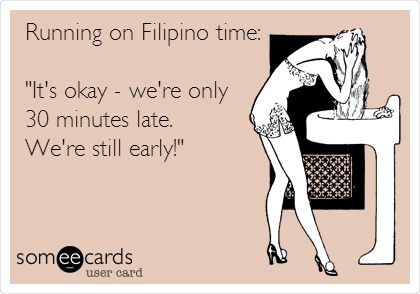The mukha (face) is targeted by the trillion-dollar cosmetics industry. They pour a big percentage of their marketing strategies into selling facial formula to men and women who desire smoother, finer, fairer skin, and wish for well-arched eyebrows, inviting eyes, taller nose, younger lips and glossy, healthy hair.
In Filipino culture pagmumukha, or the "impact of the face" demands more than cosmetic application. Such impact may be light and pleasant (magaan), refreshing (maaliwalas), and smiling or happy (masaya) which more than compensate for the lack of beauty with or without cosmetics. The opposite impact of course, even in a beautiful face, may be heavy (mabigat), sour (maasim), and problematic (problemado).
Filipinos legen großen Wert auf ihre Fassade. Die äußere Fassade ist von höchster Bedeutung. Sie unterscheiden klar zwischen äußerlichem Anschein und innerem Selbst. Ehemänner werden niemals mit anderen über Auseinandersetzungen mit der Ehefrau sprechen, denn dies würde auch ihre Schwächen beleuchten. Viele unglückliche Ehen bestehen, "bis der Tod sie scheidet", so sehr beide darunter leiden mögen - nur um in der Öffentlichkeit den Schein zu wahren.
Für manche Filipinos zählen gar ausschließlich Äusserlichkeiten, so daß sie versuchen, ihre Illusionen anderen zu verkaufen. Filipinos haben ein besonders feinsinniges Gespür für derartige Oberflächlichkeiten. Sie bezeichnen solches Gaukelwerk als BALATKAYO (Heuchlerei) oder PAKITANGTAO (öffentliche Show). Konsequenterweise beurteilen Filipinos eine Person nach ihrem inneren Selbst (LOOB), das den Charakter bestimmt.
Filipinos attach great importance to their facade. The outer facade is of paramount importance. They make a clear distinction between outward appearances and inner self. Husbands would never speak to others about arguments with their wives, as this would highlight their weaknesses.The aim of unhappy marriages is to persist "until death dies them part" - as much as both may suffer - just to keep up appearances in public.
For some Filipinos only appearances count, so they try to sell their illusions to others. But they have a particularly fine feel for such superficialities. They call such jugglery work hypocrisy or public show. Consequently, Filipinos judge a person according to their inner self, which determines their character.




















